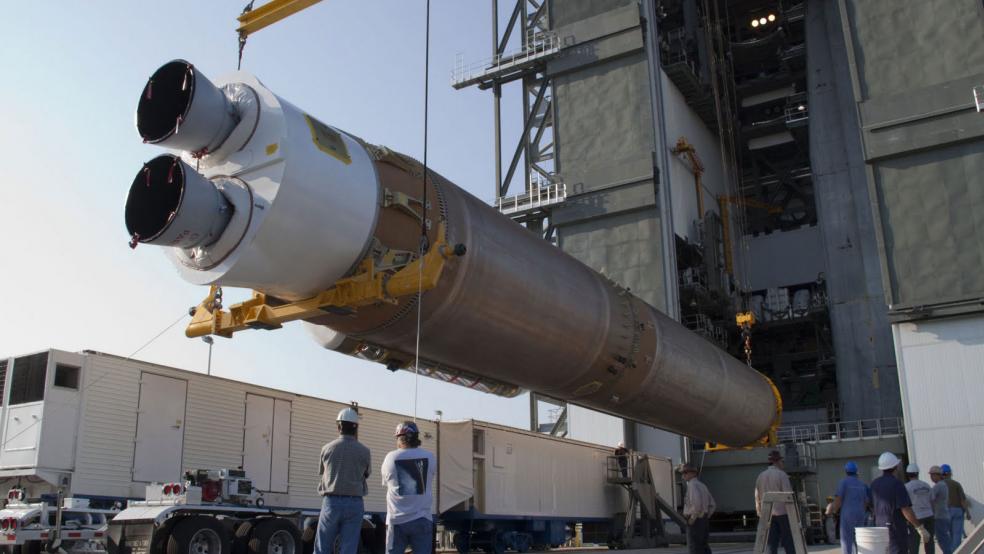With just weeks before a critical deadline to fund the federal government looms, a fight is brewing on Capitol Hill over the kind of rocket engine the Defense Department can use to send its military satellites into space.
Last week, United Launch Alliance, a Lockheed Martin-Boeing joint venture, dropped out of the competition to launch the Pentagon’s next-generation Global Positioning System satellite in 2018. They surrendered a long-held industry monopoly and put Elon Musk’s SpaceX on track to win its first military contract.
Related: From the F-35 to Sonar, Foreign Arms Makers Seek Pentagon Profits
ULA officials cited language in the fiscal 2016 National Defense Authorization Act (NDAA) that restricted the company from purchasing only four Russian-made RD-180 engines that power its Atlas V rocket. The restriction was imposed in reaction to Moscow’s aggression toward Ukraine.
Company leaders also complained that President Obama, who vetoed an earlier draft of the NDAA because it ignored a then-existing spending cap, has yet to sign a reworked policy bill into law and therefore they couldn’t offer a bid in time to meet last Monday’s deadline.
A ULA spokesperson did not respond to a request for comment.
Senate Armed Services Committee chair John McCain (R-AZ) and several other top lawmakers are convinced that proceeds from the engine sales – each unit costs $25 million – are being funneled to Russian President Vladimir Putin “and his cronies.” They included text in the fiscal 2015 NDAA to ban its use after 2019.
Related: Can ISIS Save the Russian Economy for Putin?
But on Thursday, Sen. Richard Shelby (R-AL), a senior member of the powerful Senate Appropriations Committee, signaled that he plans to insert language into the enormous government-funding bill known as “omnibus” that would somehow ease the RD-180 prohibitions.
Shelby is “evaluating how the omnibus appropriations bill could ensure that, until an American-made rocket engine to replace the RD-180 is developed, the Air Force has access to the RD-180 to guarantee America’s access to space, eliminate a possible national security risk, and secure approximately 800 jobs in Alabama,” spokesperson Torrie Matous said in a statement.
ULA has a massive rocket factory in Shelby’s home state of Alabama.
In July, Shelby sent the Air Force a letter asking how many RD-180 engines it needed to avoid any interruptions to the service’s launch schedule. In a letter provided by the senator’s office, a top Air Force official replied the service needed 18 more engines through 2022 for “assured access to space and to enable competition.”
Related: Has Putin Gained the Upper Hand in Syria?
Matous said Shelby agrees the Russian-made engine should be phased out over time, noting he worked $143.6 million into the fiscal 2016 defense spending bill to develop a domestic alternative engine, in addition to the $220 million already included in fiscal 2015.
Capitol Hill lawmakers have spent the last few weeks doing the nitty-gritty business of writing a must-pass omnibus spending bill to keep the government running past December 11, when the current short-term continuing resolution is set to expire.
While a few hundred million dollars may not sound like much – or make much of a difference for Moscow’s economy, which has been shellacked by international economic sanctions – an intra-party squabble over rocket engines would be another hurdle for Congress to overcome before the crucial funding deadline.
Related: Putin Revives a Cold War Dance as Russian Bombers Buzz US Carrier
The debate is already threatening to balloon into something more. McCain, a staunch advocate on defense issues who was put on a Russian sanctions list last year because of his repeated criticisms of Putin’s regime, fired off a letter to Appropriations Committee chair Thad Cochran (R-MS) urging him to block any attempt by Shelby to fund the RD-180 effort.
“I know you share my concerns about our continued use of Russian rockets in connection with military space launch and I ask you to respect the well-informed work my committee took in crafting our legislation,” he wrote in a November 19 missive.
He said ULA’s attempts to “manufacture a crisis by prematurely diminishing its stockpile of engines purchased prior to the Russian invasion of Crimea should be viewed with skepticism and scrutinized heavily” and aren’t a compelling enough reason to undermine sanctions against Moscow.
McCain, who commands the loyalty of the upper chamber’s defense hawks, added, “Avoiding year-over-year re-litigation of this matter between our authorizing and appropriations committees is in our best interest” because such a tit-for-tat would only delay eradicating Russian technology from the space- launch supply chain.
The Air Force isn’t expected to award the contract for the GPS satellite until March.





